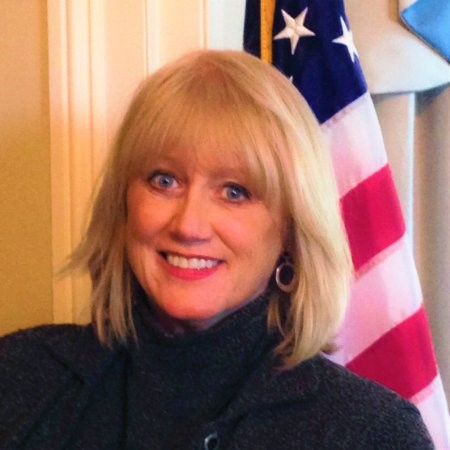Dr. Julie Norman is a Certified Economic Developer (CEcD) and Certified Workforce Development professional  (CWDP) with over 25 years of public and private sector experience in economic development with emphasis on recruitment, expansion, and strategic workforce development for business and industry.
(CWDP) with over 25 years of public and private sector experience in economic development with emphasis on recruitment, expansion, and strategic workforce development for business and industry.
Prior to assuming her current position as Executive Director for the Marion County Economic Development Commission in 2013, she served as the Deputy Executive Director of WORKFORCE West Virginia, the state agency responsible for both economic development and all state and federal workforce development programs for West Virginia.
She also spent several years at the WV Department of Commerce where shed recruited hundreds of companies to the state including Coldwater Creek, Amazon, and Toyota. Dr. Norman has served as an Associate Professor of Business at the University of Charleston (WV) where she taught undergraduate courses in economics, organizational behavior and labor relations, as well as a module on Leadership, Innovation and Change as part of the Executive Masters of Business Administration (EMBA) program.
In addition to her doctoral degree in Educational Leadership from West Virginia University, Dr. Norman holds a MBA in Human Resource Management and an undergraduate degree in Business Administration from Marshall University, and is a graduate of the Economic Development Institute from Oklahoma University at Norman OK, and the South Carolina Economic Development Institute.
You have been the executive director of the Marion County Economic Development Commission for nearly three years, during that time the unemployment rate has plummeted from 16.1 percent to 9.1 percent. What did you do to make this improvement?
Well, first let me say that I didn’t do anything alone. I’ve had the help of many exceptional individuals…our legislative delegation, county officials, the education community, industry representatives, and community leaders…and a slow and steady economic recovery from the Great Recession. This is a community effort that I’m proud to lead and we’ve been quite successful in making a significant impact in Marion County over the past two years.
During your tenure, what manufacturing or economic development projects have you announced?
Since I have been on the job we have announced 4 new businesses locating to Marion County and also 4 expansions of existing industries creating over 500 jobs and adding $70 million in capital investment. The new businesses were Green Fence Recycling, Quality Farms, Best One Tire, and Swamp Fox Entertainment Complex.
Two of the expansions were with SoPakCo, the county’s largest employer and food processor of Meals Ready-to-Eat for the military and other commercial food products. One of the expansion projects was Precision Southeast who will now operate out of our new spec building and expand it to 150,000 square feet and add 120 new jobs. And the other expansion was with Aerial Options, a small manufacturer of telescopic waterway systems for the fire truck industry.
In addition, we secured $2.3 million to implement the Pee Dee Agriporium, a regional agribusiness venture that includes a food hub to provide local produce to restaurants and grocers along the Grand Strand, a commercial kitchen incubator to develop value-added food products, and a retail store to sell those products to the 15 million travelers along US Hwy 501 who visit the Grand Strand annually.
With a state highway connecting your county to I-95 and just a two hour drive from both the port in Charleston and the Inland Port in Greer, why does it make logistical sense for a large manufacturer to bring a facility to Marion County?
Oftentimes folks mistakenly overlook Marion County because we do not show up on the radar as having an interstate within the county. However, we do have a fantastic 4-lane US highway that connects to I-95 only 15 miles away….the primary corridor of the east coast that reaches two-thirds of the US market.
In addition, the ports of Wilmington and Charleston are less than a 2-hour drive and the inland port of Greer is easily accessible as well. Marion County is ideally situated to serve any manufacturer who relies on ports and interstate access, and operating out of Marion County can be done at a fraction of the cost of other locations.
Those who currently transport by way of other ports or think they need to be in metropolitan areas are likely not maximizing their profitability. They really need to take a look at Marion County as a place to locate their operations because as a Tier 4 County we can offer far greater incentives than other locations.
Is it difficult for a county like Marion to recruit outside business with Greenville, Columbia and Charleston garnering most of the attention?
Those metropolitan areas have enjoyed tremendous success in recent years, and I anticipate the economic growth to continue. However, you can’t ignore the fact that eventually those locations will run out of land, buildings, infrastructure capacity, and workers, and it could be soon.
The smart forward-thinking developer or business location decision-maker will surely recognize that situation and look beyond the Big 3 Metro areas of South Carolina. In Marion County we have certified sites from $5,000 per acre, exceptional state-of the-art buildings from $2 per square foot, and greater incentives as a Tier 4 County. I think the biggest problem is that people simply aren’t aware of what we have to offer.
Because the State of South Carolina has three very distinct hubs for business in Greenville, Columbia and Charleston, what can Marion County do to differentiate itself?
We’re unencumbered by bureaucracy and far cheaper in every way than any other location in South Carolina, we are closer to I-95 and the ports than most, we have an available skilled workforce with the local resources to address any training need, and also enjoy a greater quality of life as a small rural community only 45 minutes from the Myrtle Beach Grand Strand.
What local schools are you working with to develop workforce talent?
We have very strong partnerships with Florence-Darlington Technical College and its Southeastern Institute for Manufacturing Technology (SIMT) and Francis Marion University. In fact, we have just recently started a manufacturing certificate training program in Marion County in conjunction with Florence-Darlington Technical College and anticipate that the program will be expanded to serve more than 50 additional students over the next several months.
With the state’s aerospace sector adding as many jobs as the automotive industry did following BMW’s arrival in the 1990s, could Marion County mobilize its economic development machine and work with local tech schools to build the necessary workforce to sustain an incoming aerospace project?
Absolutely! We are extremely agile, nimble, flexible and creative in our ability to address the workforce training needs of any industry; that’s been proven. Our new workforce development and training center was established for that very purpose and is available to our educational partners and industries to provide hand-on training and education to prospective, new, and existing workers.
A common complaint amongst South Carolina’s manufacturers is the status of the state’s infrastructure. How crucial is infrastructure to enticing outside business?
It’s not only crucial, it’s expected. We need to always remember that the business of economic development is extremely competitive and that we are one of thousands of locations a manufacturer might consider in their location decision. For us NOT to have suitable infrastructure in place doesn’t just make the competition more fierce, but simply eliminates us from the consideration.
How are you working with both the state and local governments to recruit industry and jobs to Marion County?
The Northeastern Strategic Alliance (NESA) has been our best source for generating leads for economic development projects. I also attend trade shows and work closely with the SC Department of Commerce, the SC Power Team, Marion County Progress, utility providers, existing businesses, and other allies to identify prospective industries to recruit.
During your two and a half years in Marion County, you have experienced economic success. Will you make any adjustments to your approach over the next few years or continue as you are?
We indeed have experienced great success in the past two years and will no doubt continue many of the approaches we’ve implemented thus far. But Marion County is constantly evolving and discovering new and innovative paths toward success. We are currently in the process of taking a look at our strategic plan that was done in 2014 and creating a new two-year plan.
I anticipate that we will focus on constructing a new spec building, expanding our marketing efforts by further engaging our business partners, and exploring new opportunities in the areas of aerospace, automotive, food processing, recreation and tourism. Stay tuned…more great things to come.


Be the first to comment on "Leadership Grit: Straight talk from Marion County Economic Development Commission’s Executive Director, Dr. Julie Norman"